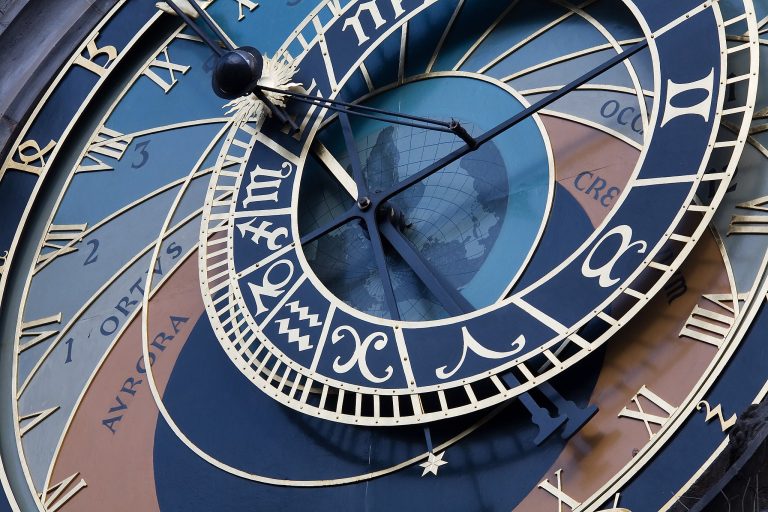In everyday life, time is perceived as a commodity. Either we “have” time, we “make” time, or we “lack” time. When measured, it is thought of as an idea that allows us to predict when the day will end and when each season will arrive.
From experience, we may feel that time is not constant. While doing something we enjoy, it seems to flash by, yet it drags when we would rather be doing something else. Some hold that our perception of time is related to our age, while others say that the length of the day has indeed changed, because the Earth is spinning at a faster rate.
Time is essential to existence. It provides the framework for an infant to age and mature. It dictates historical events, and both the formation and erosion of geological elements. It encompasses everything we have experienced, separates the past from the present, and gives us the important concept of a future – encouraging us to hope and strive to improve it.
Since time plays such a fundamental role in our lives and existence, it is only natural to wonder about its nature and universality. Here we will consider various insights on the passage of time.
Human perceptions of time
In its simplest sense, time is perceived through changes in nature. The movement of the sun through the sky and the changes in vegetation as temperature shifts throughout the year provide tangible evidence that time is passing. This understanding of time has been fundamental to human activities such as agriculture.
Success
You are now signed up for our newsletter
Success
Check your email to complete sign up
Time has also been understood in philosophical ways. The ancient Greeks, for instance, thought of time as the medium for the saving acts of gods. They also explained the concept of time using two terms: “Chronos,” which refers to quantitative time, and “Kairos,” which alludes to the quality, permanence and significance of each moment.

In orthodox religions such as Judaism, time is a creation of God. It came into existence when God created the universe, and it dictates changes in His creation. As the Creator, He transcends time, for He exists in a realm beyond the perception of our physical dimension that is not limited by the laws that govern our world. Time is thus a component of creation that defines human existence.
In the early 20th century science established that time is not the same throughout the universe. Physicist Albert Einstein found that time ellipses at different rates in the cosmos, depending on the gravitational forces and the speed of the object or observer. With this discovery, the existence of different temporal spaces in the universe went from being “unscientific” to becoming one of the most enigmatic subjects of study.
Beyond the human dimension
The existence of different time-spaces has been discussed since ancient times. They have often been referred to as other dimensions or remote places where time is extremely different from that of the Earth.
In the West, religion has spoken of the timelessness of God and His realm. Psalm 90:40 of the Bible says “For a thousand years in Your sight are like a day that has just gone by, or like a watch in the night.” The eternity of God, contrasted with the impermanence of man, alludes to the temporal difference of spaces beyond our own. For an eternal God, billions of years on Earth could pass like a second.
In the East, before belief in the intangible was stifled by science, stories about travel to other dimensions were rather common. This rings especially true in ancient China, a place where mortals and divine beings were said to have coexisted.
Accounts on the existence of other time-spaces
The Book of the Later Han (Hòu hànshū 後漢書) and the Readings of the Taiping Era (Tàipíng yù lǎn 太平御覽) both document the story of Fei Changfang, an official during the Han Dynasty.
The account relates that Fei Changfang once saw a man named Hu Gong jump into a gourd and disappear. Hu Gong practiced medicine and sold medicine from his gourd in the market. Fei Chanfang understood that Hu Gong had mastered Taoism and decided to learn from him. The Taoist master saw that Fei had good potential, and took him as his student.
Fei had to pass several tests to prove his spiritual discernment, so one day Hu took him to a special dimension where he would face a group of roaring tigers and a bunch of poisonous snakes. Fei remained unmoved amidst the frightful scenes. Passing his test, he attained the goal for the day and was sent back to the human realm – only to discover that a year had passed in his absence.

A similar record is found in the Buddhist booklet entitled A Tour to the Paradise of Ultimate Bliss. It describes a monk who went to the celestial realm of Buddha Amitābha and spent one day contemplating the wonders of this paradise. When he went back to the human realm, however, six years had already gone by.
Scientists say our planet is spinning faster
When describing their personal perception of time, it is common for people to have the feeling that there is not enough time in the day. This impression is not entirely subjective, as scientists have recently found evidence that the Earth is spinning faster.
But the Earth’s rotation has not always been speeding up. For centuries, the Earth’s rotation had been showing a long-term slowdown, causing discrepancies between our accurately measured International Atomic Time (TAI) and the observed solar time (UT1), which varies with the irregularity of the Earth’s rotation.
Between 1972 and 2016, leap seconds were added to the Coordinated Universal Time (UTC) to compensate for this difference. As of 2020, a total of 27 leap seconds had been added, each of which extended the length of the day on Earth.
This pattern changed on July 19, 2020, however, when the day on Earth was recorded to be 1.4602 milliseconds shorter than the usual day length. This became the shortest day ever recorded, with the record being broken more than 20 times in the following years.
Our planet keeps spinning faster, and scientists don’t know why. Although this change in time measurement is almost imperceptible to humans – it would take decades for us to empirically notice any change in the length of the day, modern technology, which relies heavily on time being consistent with the usual positions of the Sun, Moon and stars, could quickly become obsolete.

Scientists are considering the use of negative leap seconds, a method never used before, to address this time-keeping mismatch.
How age affects our perception of time
Many people have reported having the feeling that time passes faster as they get older. It is a common phenomenon for days to seem longer in our youth than they do after we mature.
Professor Adrian Bejan provided a possible explanation in a paper published in March 2019. He proposed that the neural degeneration caused by aging slows down the rate at which we process visual information, resulting in us perceiving fewer ‘frames-per-second.’
Just like normal or fast motion film shows fewer frames-per-second than slow motion – which reveals more frames-per-second, the brain of an elderly person captures less information, with more actual time passing between the perceived mental images.
This theory appeals to many researchers because it employs simple principles of physics and biology. However, it is not the only explanation.
Another hypothesis holds that our subjective perception of time is directly related to the length of our lives. For example, for a 10-year-old child, one year represents 10 percent of his entire life, while for a 50-year-old person, one year represents only 2 percent. The more memories we carry, the less unique each instant will seem, and the less conscious we are of the passage of time.
Still another theory is based on neural metronomes, brain cells that fire at constant frequencies regardless of what happens in their environment. This hypothesis explains that in the same way that the heart rate slows down as we age, the pacemaker in a person’s brain also slows down, reducing the number of conscious experiences we have in a given unit of time.
How should we spend our time?
With the certainty that time is subjectively and/or objectively passing faster, the question naturally arises as to how to use it wisely.
Since the beginning of time, human beings have pondered the meaning of life, and strived to find fulfillment. It is hard to deny that devoting time to meaningful matters, even if it passes in the blink of an eye, is never regretted.
On the contrary, those who live a life full of worries and desires, may feel that time is always running against them, while satisfaction with their present, and with their whole existence, may be impossible to achieve.
Although our destiny may remain an eternal mystery during our time on Earth, we would do well to heed the guidance that sages and enlightened beings have imparted to humankind over the millennia: a righteous and moral life, however long it may be, is a life well spent.













